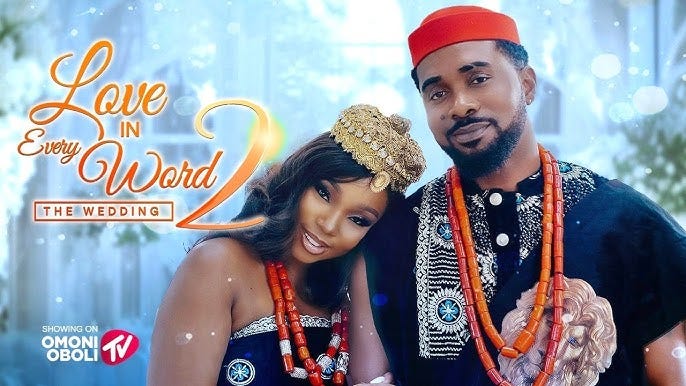Showing on YouTube, Love in Every Word – The Wedding has quickly racked up millions of views, but beneath the hype lies a film that struggles to maintain momentum and credibility.
Plot Overview
The story centers on Achalugo, affectionately known as Chioma, as she navigates her relationship with her Odogwu, balancing love, life, and family drama on the way to the wedding aisle. On paper, it’s a classic romantic narrative: love challenged by life’s twists and the disapproval of family. In practice, however, the film falters, relying too heavily on coincidences, contrived conflicts, and drawn-out sequences that make the nearly three-hour runtime feel unnecessarily long.
The Pacing Problem
From the outset, the film suffers from pacing issues. Several scenes drag on far longer than necessary, testing the viewer’s patience. Watching parts of it at 1.25x speed feels almost essential just to get through the story. While audiences online have expressed excitement and attachment to the characters, it’s hard to deny that the editing could have been tighter to maintain engagement. Long stretches of inactivity, repetitive dialogue, and overly extended romantic or comedic sequences contribute to a sluggish viewing experience.

Convenient Coincidences and Contrived Plot Points
One of the biggest weaknesses of the film is its reliance on improbable coincidences. Chioma bumps into both her future mother-in-law and her former boss at the same resort in a single sequence — a setup that strains credibility and feels far too convenient. The timing of these encounters is highly contrived, undermining any sense of realism in the story. Additionally, the resolution of the mother’s disapproval of Odogwu feels abrupt and unearned, leaving the audience to wonder how a character that supposedly holds deep reservations about a relationship can change her mind so suddenly and conveniently.
Character Development Issues
While Chioma’s ambition and friendship provide some texture to her character, the male lead, Odogwu, is problematic in terms of believability. His mother’s disapproval feels illogical given his age and presumed maturity; a man deeply in love would likely have facilitated introductions between the most important women in his life earlier in their relationship. Supporting characters like Chris Attoh’s role are underutilized, offering little tension or narrative weight, and occasionally serving as unnecessary distractions rather than meaningful contributors to the plot.
Comedic Relief Falls Flat at Times
The comic relief, primarily provided by Chioma’s best friend Ify, offers some entertainment but often borders on overacting. While she adds moments of levity, her exaggerated responses — crying more than the bereaved — sometimes feel excessive and detract from the narrative’s emotional impact. Rather than elevating the story, the comedy occasionally feels forced and jarring.
Overstuffed Product Placement
Another distracting aspect is the overabundance of product placements throughout the film. These interruptions break immersion, turning key scenes into commercial showcases rather than integral story moments. Combined with the lengthy runtime, this makes the film feel inflated and unfocused, detracting from the emotional weight of the romantic storyline.
Final Verdict
Love in Every Word – The Wedding has undeniable star power and a storyline that could have been charming, but it ultimately fails to deliver a compelling cinematic experience. With excessive length, contrived coincidences, uneven character development, and jarring comedic moments, the film is far from the seamless romance it attempts to portray. Viewers may enjoy certain aspects on a surface level, but as a complete work, it struggles to justify its hype.
In conclusion, while audiences are streaming it in droves, The Wedding serves as a reminder that even beloved franchises or anticipated sequels cannot escape the pitfalls of poor pacing, weak plot construction, and overreliance on gimmicks. For those seeking a tightly told romantic story, this film may feel more frustrating than entertaining.

















